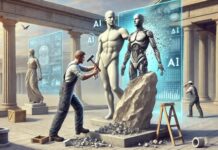Each week we find a new topic for our readers to learn about in our AI Education column.
Artificial intelligence feels so new and so big that it can be difficult to raise our heads a little bit to see what’s coming next—but this week in AI Education we’re going to do just that by discussing quantum computing and how it intersects with AI. Quantum computing applies principles of quantum mechanics to computers, creating machines capable of doing more work, and faster, than conventional computers.
How We Got Here
Quantum computing as a concept came across our radar in two different ways this week. In the first one, we were casually reading an Insider Monkey roundup (published this past weekend) about the biggest advancements in artificial intelligence thus far in 2024. In another, Microsoft recently announced quantum computing support within its Azure suite, creating a meaningful—and accessible—link between quantum computing and artificial intelligence.
That triggered a deeper dive into this technology and what it may mean for AI. When I read the word computer, I think of my personal laptop or desktop machine, or of the rooms of giant computers I used to run through as a child in the basements of institutions like universities and hospitals. Quantum computing, however, refers to not just the physical hardware, but the algorithms and other intellectual assets that make the machines work.
Quantum computers work using quantum mechanics, a set of rules governed by quantum physics. Using these mechanics, quantum computers can solve more complex problems that traditional machines and perform computations in a small fraction of the time it would take a traditional computer to do the same—but, according to IBM, no currently existing quantum computer can perform a useful task faster, cheaper or more efficiently than a classical computer.
What Are Quantum Mechanics
Okay, I’m no Einstein. I’m not even Sir Isaac Newton—but quantum mechanics speak to a subatomic world that is governed by rules beyond Newton’s laws of motion, the physics of the “macro” world that we inhabit and work in. The particles at this subatomic level behave differently from objects in our macroscopic world, and their motion is described be different mathematical equations.
According to IBM, there are four key principles of quantum mechanics:
- Superposition: The state in which a quantum particle or system represents not just one possibility, but a combination of possibilities.
- Entanglement: The process in which multiple particles or systems can become correlated more strongly than probability allows.
- Decoherence: The process in which particles and systems can decay, collapse or change, moving to single states measurable by classical physics.
- Interference: The phenomenon by which entangled quantum states can interact and produce more and less likely probabilities.
Why Does Quantum Mechanics Make Computers So Powerful?
Sycamore, a quantum computer being developed by Google, anecdotally performed a calculation in 200 seconds that would have taken a traditional supercomputer 10,000 years to perform. Earlier this year, technology enthusiasts buzzed in response to rumors that NASA had shut down its own quantum computer after it had performed a calculation far faster than anticipated, and then unexpectedly proceeded to deliver output of an unknown origin.
A classical computer is built on the integrated circuit, itself built on the transistor, which relies on binary bits, read as ones, or the on state, and zeros, or the off state, to store and process data. Quantum computers, on the other hand, use quantum bits, or qubits, according to IBM. Like a binary bit, a qubit can store either a one or a zero, but it can also be a weighted combination of one and zero at the same time—a third “quantum” state that is best thought of not as a single third state, but a spectrum of possibe states.
When used in combination, qubits scale exponentially greater than classical binary bits. Two qubits can store four binary bits of information, three can store eight, four can store 12, and so on. A quantum computer comes with several drawbacks—one being that qubits have to be stored at extremely low temperatures in a near vacuum. The other being that observation of a quantum state tends to collapse that state, or closing the qubit into a binary on or off state.
What Does This Have to Do With AI?
Because AI and related technologies use so much computing power, it’s conceivable that the growing demand for computing power will exceed our ability to continue making ever-more powerful classical computers. Quantum computing, then, offers us the ability to grow beyond Moore’s Law (which, to this point, has governed the rate at which we improve traditional computing).
Before that happens, the speed of quantum computers will help enhance AI’s ability to solve problems, said Insider Monkey. In finance, that means that institutions will use quantum computers to help design even more efficient portfolios, and that practitioners will have the ability to fine-tune their clients’ money moves.
Quantum computing, in conjunction with machine learning, can also be brought to bear on understanding market moves, according to AWS, and running more realistic simulations to help understand what happens to a system, like a financial portfolio, in complex scenarios. It will also have a role to play in fraud detection.
Enter QAI
Quantum Artificial Intelligence, or QAI, is the combination of artificial intelligence and quantum computing. QAI is going to improve artificial intelligence by accelerating the training of neural networks, eliminating some of the limitations on data size and complexity and making it less expensive to develop and train large language models. AI in return will help quantum computing by helping researchers control immensely complex quantum processors.
In some ways, quantum computers, when made practical, will be able to birth a new generation of AI that can function more like a human brain, many orders of magnitude more complex—and more compelling—than AI driven by classical computers, wrote Jonathan Reichental in a recent Forbes article.
“As QAI gradually emerges, we can expect significant improvements in the speed, efficiency, and accuracy of AI,” wrote Reichental. “We should also anticipate the emergence of completely new and surprising business capabilities… At first, the benefits will be reaped by certain industries and needs, particularly those with optimization requirements. But later, as QAI becomes more mainstream, almost every enterprise will need to have a strategy.”
Quantum computing has only in recent years emerged from the laboratory. Major technology companies like Microsoft, Amazon, Google, Oracle and IBM have been building their own quantum computers, and are joined by several upstarts. Yet, there’s still a long way to go before quantum computers are made practical, and we’re only beginning to imagine the implications of QAI.







